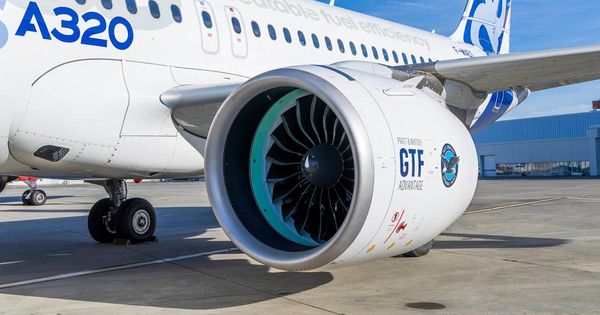Signs point to Spirit Airlines possibly filing for bankruptcy in the future after a series of financial losses and shortcomings. The airlines spent months meeting with bondholders, but ultimately failed to reach a deal that would restructure its debt.
Spiriting Away?
Spirit Airlines representatives have allegedly told the Wall Street Journal that filing for bankruptcy is the most likely choice for the airline to make moving forward. WSJ's sources clarify that a bankruptcy filing is not imminent, and the airline still has time to reach a favorable deal to avoid one. The Florida-based low-cost airline is seeking new financing from creditors and an exchange that would alleviate its current debt situation.

Bankruptcy through the Chapter 11 process would restructure the airline's debts and allow the owners to keep the company and stay in business. A court would curate the bankruptcy and the Chapter 11 plan would only move forward when Spirit's creditors are okay with the new payment situation. With a Chapter 7 bankruptcy, Spirit would liquidate assets, such as aircraft, to its creditors to pay off the debt instead. Chapter 11 seems like the likelier of the two processes as WSJ reports state a liquidation "was not under consideration".
Spirit Airlines CEO Ted Christie had these comments during the company's second-quarter earnings call back in August:
"We are engaged in productive conversations with the advisors of our bondholders to address the upcoming debt maturities. Because those conversations are ongoing, we are not going to go into detail or take any questions on this topic, or speculate on potential outcomes. Needless to say, it is a priority, and we are focused on securing the best outcome for the business as quickly as possible, while staying focused on driving performance and implementing our new travel options and elevated guest experience."
Spirit Airlines shares dipped 42% in premarket trading on Friday morning following the reports of a possible bankruptcy. A filing also reports that Spirit has until October 21 to find a willing financial partner or to extend refinance bonds that are currently due in 2025 to keep its relationship with US Bank afloat, which is responsible for the airline's loyalty credit card program.

How Spirit Got Here
The COVID-19 pandemic starting in 2020 has played a big factor in the airline racking up unpaid debt. The company currently owes creditors $3.3 billion, with $1.1 billion in bonds being due next year.
In December 2023, Spirit Airlines was poised to merge with JetBlue, which would have caused the Boston-based carrier to double in size and be in a great position to compete with bigger airlines such as United and Delta. A federal judge rejected the merger in January, citing that it would “violate antitrust laws”. JetBlue and Spirit filed an appeal .
In March, JetBlue and Spirit ceased their efforts to merge, and JetBlue agreed to pay Spirit $69 million in termination fees. TD Cowen analyst Helane Becker commented on Spirit's situation following the failed merger:
"We recognize this sounds alarmist and harsh, but the reality is we believe there are limited scenarios that enable Spirit to restructure."
Spirit also encountered problems with certain engines on its aircraft. The faulty engines, manufacturers by Pratt & Whitney, have caused flights to be grounded, taking another blow to Spirit's profits. The airline has attempted to address financial losses by reducing its "operational footprint", as well as debuting new premium seating options for travelers.
Cities in the Sky: The Future Built on eVTOL Flight » JetBlue Opens First-Ever ‘BlueHouse’ Lounge at JFK Terminal 5 » Ryanair to Appeal $302 Million Italian Fine Over Alleged Travel Agency Restrictions »
Comments (0)
Add Your Comment
SHARE
TAGS
NEWS Spirit AirlinesBankruptcyjetbluenewsRECENTLY PUBLISHED
 GlobalX Secures Rare Authorisation to Operate Intra-Canada Charter Flights
Global Crossing Airlines Group, Inc. (GlobalX) has achieved a significant regulatory milestone in its northern expansion strategy. The Canadian Transportation Agency (CTA) has officially granted the Miami-based operator authorisation to conduct intra-Canada charter flights, a permission rarely extended to U.S. carriers.
NEWS
READ MORE »
GlobalX Secures Rare Authorisation to Operate Intra-Canada Charter Flights
Global Crossing Airlines Group, Inc. (GlobalX) has achieved a significant regulatory milestone in its northern expansion strategy. The Canadian Transportation Agency (CTA) has officially granted the Miami-based operator authorisation to conduct intra-Canada charter flights, a permission rarely extended to U.S. carriers.
NEWS
READ MORE »
 GTF Storage Crisis Deepens: 835 Aircraft Grounded as Pratt & Whitney Recalls Surge Post-Mid-Year
The operational crisis surrounding the Pratt & Whitney Geared Turbofan (GTF) engine family has reached a new peak. As of late Q4 2025, the number of stored jets powered by the PW1000G family has climbed significantly, highlighting a widening gap between maintenance capacity and the relentless pace of engine recalls.
INFORMATIONAL
READ MORE »
GTF Storage Crisis Deepens: 835 Aircraft Grounded as Pratt & Whitney Recalls Surge Post-Mid-Year
The operational crisis surrounding the Pratt & Whitney Geared Turbofan (GTF) engine family has reached a new peak. As of late Q4 2025, the number of stored jets powered by the PW1000G family has climbed significantly, highlighting a widening gap between maintenance capacity and the relentless pace of engine recalls.
INFORMATIONAL
READ MORE »
 Ryanair to Appeal $302 Million Italian Fine Over Alleged Travel Agency Restrictions
Ryanair has announced its intention to challenge a €255.8 million ($302 million) fine imposed by Italy's competition authority, which accused the airline of obstructing travel agencies and online booking platforms from selling its flights.
NEWS
READ MORE »
Ryanair to Appeal $302 Million Italian Fine Over Alleged Travel Agency Restrictions
Ryanair has announced its intention to challenge a €255.8 million ($302 million) fine imposed by Italy's competition authority, which accused the airline of obstructing travel agencies and online booking platforms from selling its flights.
NEWS
READ MORE »



